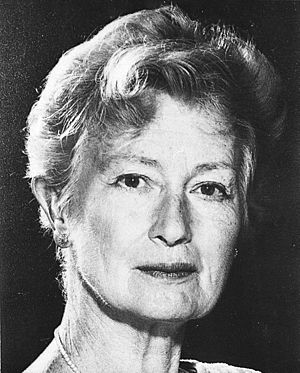Helen Muir facts for kids
Quick facts for kids
Helen Muir
CBE, FRS
|
|
|---|---|
 |
|
| Born |
Isabella Helen Mary Muir
20 August 1920 Nainital, India
|
| Died | 28 November 2005 (aged 85) Bedale, Yorkshire, UK
|
| Nationality | British |
| Occupation | biochemist |
| Honours | |
Isabella Helen Mary Muir (born August 20, 1920 – died November 28, 2005) was a brilliant British biochemist. She was known for her groundbreaking work on understanding what causes osteoarthritis, a common joint condition. Her discoveries helped many people.
| Top - 0-9 A B C D E F G H I J K L M N O P Q R S T U V W X Y Z |
About Helen Muir
Her Early Life
Helen Muir was born in Nainital, India, in 1920. She spent her first 10 years there. Her mother taught her at home, so she didn't go to a regular school.
In 1930, when she was 10, Helen moved to Europe. She started her formal education at a boarding school in Montreux, Switzerland. Later, she attended the Downe House School in England.
In 1940, Helen began studying at Somerville College, Oxford in Oxford, England. She first planned to study medicine. However, her tutor, the famous scientist Dorothy Hodgkin, inspired her. Helen decided to switch her studies to chemistry instead. She earned her degree in 1944.
Helen then continued her studies. She earned her PhD in 1947. Her research focused on making penicillin, a very important medicine. This was during World War II, so finding ways to stop wound infections was a top priority.
Her Adult Life and Career
Helen Muir was a dedicated scientist who never married. After getting her PhD, she worked at the University of Oxford. In 1949, she moved to London. She joined a new research group at the National Institute for Medical Research.
Here, Helen's interests changed. She started focusing on biology. She published important papers on how certain chemicals are made in the body. This early work led her to study collagen and other human connective tissues. Connective tissues are like the "glue" that holds our bodies together.
Helen spent most of her career at the Kennedy Institute of Rheumatology. This institute in Hammersmith was the first of its kind. It focused on studying and treating joint diseases.
In 1966, Helen was asked to lead a research division there. Her team at the Kennedy Institute made big discoveries. They studied proteoglycans. These are special proteins that are a major part of cartilage. Cartilage is the flexible tissue in our joints.
In 1977, Helen became the director of the Kennedy Institute. In the same year, she was made a Fellow of the Royal Society. This is a very high honor for scientists. Only a few women had received it at that time.
Helen Muir is widely recognized for her work on osteoarthritis. She discovered and explored the different causes of this condition. Before her work, many people didn't think osteoarthritis was important to study. Her research helped us understand the biochemical reasons behind it.
Helen retired from the Kennedy Institute in 1990.
Her Later Years
After retiring, Helen Muir moved to Yorkshire. She remained interested in science and medicine. She even added solar panels to her house! She also worked to protect local wildlife habitats.
Helen Muir passed away on November 28, 2005. She died at her home near Bedale, Yorkshire, after battling breast cancer for several years. Her contributions greatly advanced our understanding of joint health.
 | Aurelia Browder |
 | Nannie Helen Burroughs |
 | Michelle Alexander |

